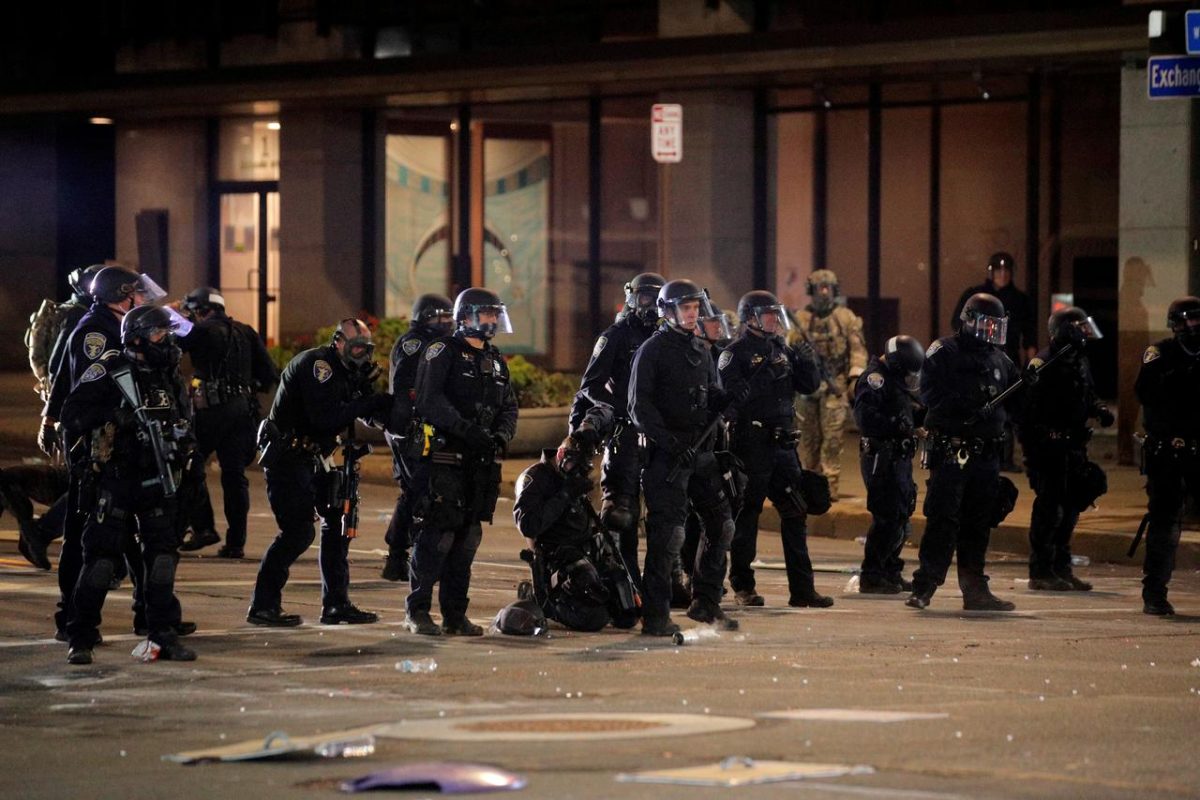LOUISVILLE, Ky., (Reuters) – Armed police supporters and anti-racism demonstrators clashed in Louisville yesterday before the Kentucky Derby horse race, while Rochester police used tear gas to disperse protesters, as discord in cities across the United States continued to simmer.
In the afternoon, hundreds of protesters marched toward the Churchill Downs track in Lousiville chanting “No Justice, No Derby” – a nod to activists’ calls to cancel the annual race, which was being held without spectators because of the coronavirus.
Separately, roughly 250 members of a Black militia group named NFAC that has protested against the police killings of Black people assembled outside Churchill Downs, all armed with long guns. NFAC leader John “Grandmaster Jay” Johnson taunted the officers standing guard in front of the track, but the group later retreated without incident.
Louisville has emerged as a key flashpoint in a summer of unrest because of outrage over the death of Breonna Taylor, a 26-year-old Black woman who was killed in March when the city’s police burst into her apartment using a so-called “no-knock” arrest warrant that did not require them to announce themselves.
Sadiqa Reynolds, president of the Louisville Urban League, said that while the race was not canceled as hoped she believes demands of protesters, which include holding officers involved in Taylor’s death accountable, were heard.
“Today was a show of force from the community of Lousiville to say that enough is enough,” she told Reuters. “We are tired of our lives not mattering.”
Earlier on Saturday, a group of counterprotesters, brandishing pistols and long guns, squared off with Black Lives Matter protesters and got into shoving matches in a park downtown. People on both sides screamed, faces inches apart. After about 45 minutes, police cleared the people from the park, but the protests outside Churchill Downs continued.
The counterprotesters included about 250 pro-police demonstrators, including Dylan Stevens, who goes by the nickname “The Angry Viking” and claims to lead a group of what he calls “Patriots.” According to his website, Stevens supports Republican President Donald Trump, the police, the military and the right to bear arms.
Stevens, who was armed and dressed in tactical gear, told protesters he was not there to oppose them, according to the Louisville Courier-Journal. He said his group had come because of a threat made by NFAC leader Johnson in July to “burn the city to the ground” if justice was not done in the Taylor case, the Courier-Journal reported.
ROCHESTER POLICE USE TEAR GAS
Demonstrations against racism and police brutality have swept the United States since May 25 when George Floyd, a Black man, died after a Minneapolis police officer knelt on his neck for nearly nine minutes.
In Rochester, New York, police used batons, pepper balls and tear gas to push back about 2,000 protesters who marched toward the Public Safety Building on Saturday night, chanting “Black Lives Matter” and “Daniel Prude” – a reference to the Black man who died after an encounter with police in March.
The Rochester Police Department said in a statement that protesters had ignored their orders to disperse, and that some hurled bottles, rocks and fireworks at officers.
Demonstrators started their march at the site of Prude’s arrest. It was the fourth night of protests, which came after Prude’s family released body camera footage showing officers pinned Prude to the pavement and restrained him with a hood.
In Portland, Oregon, where protests have been ongoing for three months, officials were bracing for another night of unrest. Police arrested 27 people on Friday, mostly on charges of interfering with law enforcement or disorderly conduct.
Police shot and killed a self-declared anti-fascist activist in Washington state on Thursday night as they moved in to arrest him on suspicion he fatally shot Aaron Danielson, a right-wing counterprotester, last weekend in Portland.
On Saturday afternoon, hundreds of friends of Danielson gathered in a park in Vancouver, Washington, north of Portland, to memorialize his life, cut short at 39 years, according to a Reuters witness.






